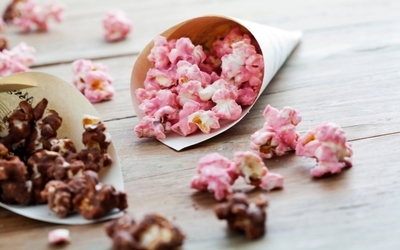In an ideal world, everyone would snack on fruit and carrot sticks. If you’re one of the few that already do, well done! For everyone else, snacking is a tricky area of your diet to navigate. It can be difficult to know what’s good for you and what isn’t – you may be surprised to know that some of these snacks make the unhealthy list, despite much PR to the contrary. It’s easy to be swayed by a bit of fancy marketing that tells you that something is good for you, but do you really know what you’re eating? Here are a few snacks masquerading as good for you, and the real nutritional details you need to know about.
Home-style popcorn
Popcorn should be great for dieters, as its naturally low in fat and calories, a whole grain and surprisingly high in antioxidants. If you were to make this from freshly popped kernels in your own home, you’d be fine. However, in the hands of manufacturers this becomes an unhealthy snack. Suddenly, our low-calorie snack food is high in salt, trans fats, calories and sugars.
Yoghurt
If yoghurt was left alone by the food industry, it would maintain its healthy nature. However, most yoghurts on the market are packed with sugars and added flavours that make them an unhealthy snack. Some products contain corn syrup, gelatine and corn starch – not ingredients you want to be eating on a regular basis. Stick to natural yoghurt and just add fruit for a sweetener – a far healthier way to eat this product.
Cheese and crackers may sound like a harmless snack, but just one serving of this has more salt and twice the saturate fat as a small portion of chicken nuggets – even more alarmingly, it contains more sugar than two Hershey’s kisses. Cheese is incredibly high in fat, so if you want to snack on this you should limit yourself to just a dice-sized cube.
If you want to make healthier choices with your snacks, you need to look for those that are high in protein, fibre, minerals, vitamins, and that are low in salt, sugar and fats. The ingredients are the top of the list will indicate to you what your product is made of. So, for example, if it is high in sugar, you know you should avoid it. Don’t be fooled by other variations though, such as glucose or malt syrups, as these are still sugar by another name. Check for foods that say they contain whole grains to ensure that they really are made up of whole wheat flour, or the equivalent. If there is just a small quantity of it, then it won’t be as good for you as you think. Try to stick to unprocessed foods where possible, such as fresh fruit and raw vegetables – you could also add a healthy dip such as houmous to make them taste a little more appealing. Nuts and seeds, as long as they are salt and sugar free, are great for snacking as they contain plenty of healthy oils and fats and are low in calories, salt and sugars. Snacking is often more out of habit than a need to eat, so try having a glass of water when you feel hungry to ensure that you really are craving food – dehydration is often mistaken for hunger and could lead to you eating empty calories throughout the day.
